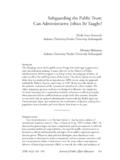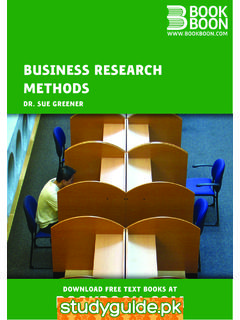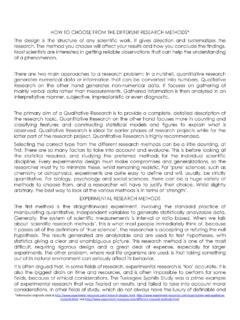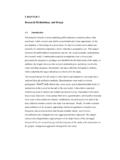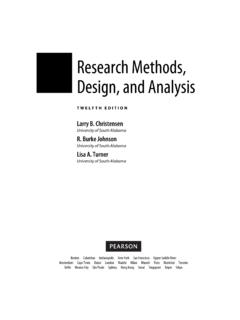Transcription of Teaching Research Methods: Learning by Doing
1 Journal of Public Affairs EducationTeaching Research methods : Learning by DoingN. Alexander AguadoUniversity of North Alabama I hear and I forget. I see and I remember. I do and I understand. ConfuciusABSTRACTThis paper outlines ways to structure a Research - methods class so that students gain a practical knowledge of how Research is done. Emphasis is placed on data collection, using statistical software, and writing up results. Included in this article are several assignments and exercises that, when combined, work to produce a scholarly empirical report. Students gain an appreciation of the fruits and frustrations involved in the Research process, and learn to be more critical consumers of Research search of a way to teach Research methods , I have turned to a practical, hands-on approach that encourages students to partake in the rewards of conducting their own empirical Research .
2 This article outlines goals and objectives, and includes a list of assignments that culminate in a presentable work of original Research . In this undergraduate, political science, Research - methods class, students learned about the Research process that is integral to all social sciences. Further, this Teaching method can easily be adapted to meet the needs of students at all levels, including graduate students in public administration and public policy. This paper outlines the steps used to accomplish this task, including the disadvantages and possible corrections for those who wish to adopt the institution, department, and instructor stresses different goals for training in Research methods . Some might emphasize the diversity of social sciences, and the types of questions asked in various sub-disciplines. Others might advocate epistemology and the need to understand the role of scientific knowledge. The goals of this course briefly cover these very important issues in the methodology 251 JPAE 15(2): 251 260 Teaching Research methods : Learning by DoingJournal of Public Affairs Educationliterature.
3 But the goal of this particular Research - methods course is to communicate the Research process by using a very practitioner-oriented method that includes data gathering, analysis via a statistical software package (SPSS version 13), and Learning the language of social-science students at both undergraduate and graduate levels possess very weak foundations for conducting empirical Research . Empirical Research is different from most of the other Research that many students have completed. This deficit makes it a challenging undertaking that can lead to frustration for both the instructor and the student. By following the steps and assignments offered here, an instructor can avoid many of the pitfalls associated with producing an original empirical Research paper, while simultaneously Teaching Research - methods instructor must find a way of conveying to students the importance of asking an appropriate social-scientific question; Learning how past researchers have addressed an issue; collecting data; and Learning how to interpret cryptic statistical output.
4 What follows is a brief outline of the steps taken to administer such a course, through a series of assignments, followed by a frank evaluation of each step and some reflections on what should be done differently in order to improve future 1: GENERATING THE QUESTIONM anaging the work and progress of Research is the instructor s primary concern. For students to learn by Doing , I prepared broad topics prior to the beginning of the semester. These general topics in local government were meant to tap into the students various interests. They included the Alabama constitution, bureaucrat-lawmaker relations (principal-agent problems), intergovernmental cooperation, and citizen contacts. I provided students with citations and background readings for each Students were assigned homework from a traditional Research - methods text, and also completed workbook exercises (Johnson & Reynolds, 2005b; Pollock, 2003) prior to discussions of specific Research questions.
5 During a class session, students were divided into teams, and each team came up with a set of very intuitive hypotheses. The hypotheses were then followed with the question of why?, which directed students to the next step of writing a literature review. Below are examples of the students Constitutional IssuesHypothesis 1:Partisan identification is connected to support for the state constitution. Why?Hypothesis 2:Lawmakers who favor home rule are unhappy with their positions. Why?252 Journal of Public Affairs EducationTeaching Research methods : Learning by DoingIntergovernmental RelationsHypothesis 3:Lawmakers are increasingly tied to other governments and non-governmental organizations ( , Chamber of Commerce). Why?Hypothesis 4:The smaller the city, the more it needs intergovernmental cooperation. Why?Citizen ContactsHypothesis 5:Lawmakers are not concerned about citizens. Why?Hypothesis 6:Lawmakers will probably claim that the poor are less likely to contact them.
6 Why?Bureaucratic PoliticsHypothesis 7:Lawmakers with longer service records tend to show more trust in government employees. Why?With guidance from the professor, all of the hypotheses were generated from topics of student interest. Tailoring the Research questions in this way facilitated the cumulative method of writing a Research paper by encouraging the students buy-in to the process. Using student-generated hypotheses for the purpose of Teaching Research and reporting methods also fostered motivation, interest, and ultimately a deeper understanding of Research results. In addition, the early partnership between professor and student in the hypothesis-generating process allowed for the type of collaboration that continues throughout the semester. The collaborative nature of the exercise also allowed certain aspects of the Research to be designed specifically to meet course expectations and requirements. For example, the above-mentioned hypotheses were easily adapted to the bivariate analysis techniques presented in this particular class.
7 As an instructor, I want to encourage students to explore their interests, but I also need to maintain enough control for course goals to be met. In conducting this class, I sided with control over choice. Admittedly, the questions and topics were closely tied to my own Research interests and areas of expertise. Not all students were thrilled by the idea of researching local governance, but I found that they enthusiastically embraced the challenge once we started a literature review and began gathering Census data for the cities that were in their Research Research methods : Learning by DoingJournal of Public Affairs EducationASSIGNMENT/STEP 2: THE LITERATURE REVIEWThis step offers the instructor an opportunity to expose students to important online archives that typically are not used in other courses, but that are essential to conducting original Research . Using the Internet posed new problems and new possibilities.
8 At this point, it was helpful to discuss the benefits and dangers of Internet Research . For example, use of Wikipedia a popular online information source for many students was discouraged, but other available resources and Research methods were discussed and debated in the classroom. Exercises from the Johnson and Reynolds (2005b) workbook were assigned to give students a functional background on what constitutes a legitimate , students learned how to conduct literature reviews by using peer-reviewed articles from JSTOR ( ) and EbscoHost ( ). Most university libraries have paid subscriptions to access these databases. Students ideally should have on-campus database access, but, depending on library policy, they might have to access databases from an off-campus computer, via a log-in on the school s Web site. Instructors should check with their school libraries to obtain off-campus computer access procedures. Instructors also should note that the most recent publications often are not available through these academic databases.
9 There is usually a three- to five-year lag time between the journals actual publication dates, and the dates they become available on an academic database, called a moving wall. 2 For this portion of the paper the assignment was straightforward:This section is the part where you discuss the works of past researchers who have examined similar questions. Be able to cite at least 5-7 sources taken from peer-reviewed works found in the JSTOR or EbscoHost archives. End this section with a paragraph that clearly states the hypotheses you plan to test, and why this relationship is important, based on the literature you just number of citations and the length of the literature reviews were picked arbitrarily. One of the aims of this assignment was to familiarize students with the vast archives of available peer-reviewed journals. However, conducting the literature review this way often resulted in students overlooking books as sources.
10 Students were advised to talk to me if they wanted to include books in their literature reviews, because I was concerned about them citing books that did not rely on empirical evidence to make their claims. Although this problem did not arise when this Teaching strategy was employed, it may be a problem in future 3: DATA GATHERING Data gathering poses problems for social science researchers, and new 254 Journal of Public Affairs EducationTeaching Research methods : Learning by Doingchallenges for students in Research - methods courses. The goal of this portion of the course was twofold: to educate students about the very large archives of available raw data and how they are entered into a statistical software package; and to create a survey instrument that in this case could be used to gauge the attitudes of local elected officials. Empirical work was the foremost priority, but I also saw an opportunity for students to become better acquainted with the community.

